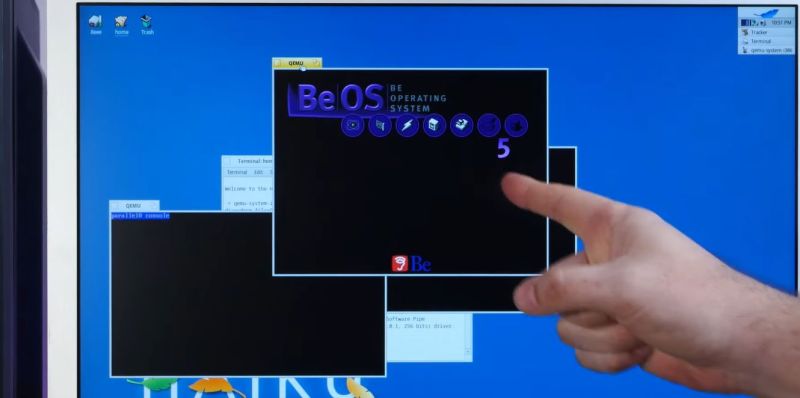Haiku is one of those open source operating systems that seem to be both exceedingly well-known while flying completely under the radar. Part of this is probably due to it being an open source version and continuation of the Be Operating System (BeOS). Despite its strong feature set in the 1990s, BeOS never got much love in the wider computer market. Nevertheless, it has a strong community that after twenty-two years of development has now reached a point where you can daily drive it, according to the [Action Retro] channel on YouTube.
One point where Haiku definitely scores points is with the super-fast installation and boot. [Action Retro] demonstrates this on real hardware, and we can confirm that it boots very fast in VirtualBox on a low-end Intel N100-based host system as well. With the recently introduced QtWebEngine-based Falkon browser (formerly known as QupZilla) even JavaScript-heavy sites like YouTube and retro Mac emulators work well. You can even get a Minecraft client for Haiku.
Although [Action Retro] notes that 3D acceleration is still a work-in-progress for Haiku, his 2014-era AMD system smoothly played back 1080p YouTube videos. Although not addressed in the video, Haiku is relatively easy to port existing software to, as it is POSIX-compatible. There is a relatively modern GCC 11.2 compiler in the Beta 4 release from 2022, backed up by solid API documentation. Who doesn’t want to take a poke at a modern take on the OS that nearly became MacOS?
















Alrighty next time I have a spare commodity box to save from recycling I’ll give it a try!
I tried to DD BeOS back around 1999. It was neat but I never had a machine where all the hardware was well-supported. I really wanted it to work but the software catalog at that time just wasn’t there.
I do have haiku in my daily driver rotation. but i think most people will find the web browser is not adequate even though it’s finally stable enough for me.
I remembered I hadn’t tried Falkon in a while so I istalled it and tried it out. It is definitely much better and I think this will push Haiku into the daily driver category for many more people.
“Kind of a Nerd”? How modest…
Honestly, I’ve always been a fan of Haiku because of its’ incredible responsiveness on even low-level hardware. It’s not a server dressed up as a desktop workstation like Linux, It’s designed from the start to be a delightful single-user experience.
Please don’t get me wrong, I love Linux. I was trained on mainframes in UNIX and had to wait several years before Linux was available to satisfy my craving. But its had to get thoroughly messaged to be suitable for desktop use.
I did daily drive QNX on a spare machine, and since it was on all the time, my kids also daily used that machine.
It wasn nothing strange to them, I ran Opera webbrowser on it, ICQ and MSN and everything else that you were supposed to have at that time.
Only problem that occured was that one of my kids saved some homework on a diskette in a file format the teacher couldnt open.
My kids also hang around in the QNX help chat on IRC and got to talk with a lot of the people working for QNX, and made lots of friends.
Is it still a do-everything-as-root-toy?
You really want to surf as root?
I guess making it 21th century proof wrt security would break compatibility with old software in multiple ways. It would be probably worth forking it so that the fork could deviate from the original and experiment with new technologies without any fear of breaking something.
Have to find a criminal that even knows what Haiku is.
Security by obscurity! The enemy is assumed to know the system.
Sorry, had to post this, computer science major union rules.
But Haiku doesn’t have a theme song that slaps like BeOS’ “Then I had to reboot a HUNDRED TIMES! Through tangled threads, and corporate crimes… You may never find love down a T1 LINE!”
Was that… White Cotton Squares?
I was thinking it would be neat to run on an RPI-5 (or 4, 3) … but I see it is x86 platform only. Seems like a slim and fast OS like this would be
… a good fit for the RPI.
An ARM port is in the works, but seems to be a bit of a low-priority task. I’m sure they’ll be happy with a developer donating some time to the porting effort :)
I personally have not tried the recent Haiku dev build that supports the VisionFive2 riscv64 target: https://discuss.haiku-os.org/t/how-to-play-with-a-riscv-version-of-haiku-in-tinyemu-or-qemu/14369/98
Haiku!
Gesundheit!
Sounds like a good name for a spin-off.
GesundheitOS
I remember that the beos filesystem had the ability to index emails and some interesting stuff like that and I kinda wish that I had bought a bebox back in the day…
“With the recently introduced QtWebEngine-based Falkon browser ”
Do you mean recently introduced to Haiku?
Falkon is around for quite a few years now…. I used it on low-end laptop some years ago and was impressed how fast it was.
No future for an Os where modern apps are not even written with native libraries.
Medo might be it’s killer app. It is a modern Media Editor built natively for Haiku OS. Medo allows customisation using OpenGL based GLSL plugins, and allows 3rd party developers to create dynamically loaded Addons and Plugins.
Medo can edit UHD 4K videos, export to any Haiku supported codec, is optimised for many CPU-core systems, and has low system resource requirements. Medo is multilingual (currently supports 10 user languages), and is themable. The Medo.HPKG (Haiku package file) can fit on a floppy disk with no external dependancies other than what ships with a default Haiku release (it’s less than 1.44Mb).
ref
https://news.ycombinator.com/item?id=25513557
LinuxS updates/upgrades … Death of software companies video using RPiOS 64 bit example video.
https://prosefights2.org/irp2023/p011624/VID_20240115_193908843%20-%20Copy%20-%20Copy%20-%20Copy.mp4
Does it have wifi support yet? I tried it out on a Raspberry Pi Zero W and it was crazy how fast if felt. But without wifi support it wasn’t really useful for what I wanted to do.
How were you able to run Haiku on a Raspberry Pi? The ARM ports haven’t progressed enough to boot to desktop yet.